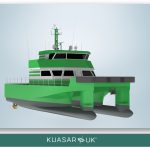£1.4m awarded to 10 organisations to develop green tech for the Maritime Sector
“We are pleased to announce the winners of the Clean Maritime Call. These projects will play an important role in supporting the British maritime sector’s vision of zero-emission shipping and the UK Government’s Maritime 2050 strategy.
“It was encouraging to see such a high quality and large volume of responses, which made it all the harder to choose only ten project winners. The quality and quantity of submissions is a testimony to the commitment to continued development and innovation across the Maritime sector.”
John Howie MBE, Chair of MarRI-UK
The press release article can be found here.
Grant Awardees
| Organisation Names | Consortium | Project Title | Project Summary | Project Value | Grant Awarded | Location | Region |
|---|---|---|---|---|---|---|---|
| Babcock International Group | Fuel Cell Systems, Plug Power, University of Warwick Manufacturing Group | FC-BATShip Fuel Cell-Battery Hybrid Ship: Advanced power-energy management solution for zero emission marine propulsion systems | In support of the UK Governments maritime emissions targets, our project vision is to build within the consortium the capability and knowledge required to develop and optimise a zero emission propulsion system design for marine applications. | £407,219.00 | £195,407.00 | London | London |
| Bibby Marine Services Ltd. | Damen Shipyards, Lloyd’s Register, Offshore Renewable Energy (ORE) Catapult, Peel Group, Square 5 | WaveMaster Zero C | This project is to identify the best zero carbon propulsion solution for an SOV (hence WaveMaster Zero C) and thus future large vessels. The project will review biofuel, hydrogen, ammonia, methanol and battery concepts against a traditional marine diesel design. This will assess both vessel and landside operation considerations, capturing technical, environmental and financial challenges. | £374,106.00 | £208,528.00 | Liverpool | North West |
| BMT | N/A | Energy Saving Technology (EST) Asset Leasing Models | Energy Saving Technologies (ESTs) are commercially available to improve vessel efficiency. However, technical and economic barriers remain which in some cases limit EST wholesale adoption. This Project seeks to investigate different commercial models that can be used to accelerate the adoption of ESTs in the global shipping fleet. | £54,321.06 | £27,160.53 | London | London |
| Green Fuel Research | London South Bank University, University of Cardiff | SALMO: Sustainable Aquaculture Leading to Marine Opportunities | In this project, they will develop and validate methods for safely processing waste from salmon farming, other UK aquaculture and the UK live-catch fishing industry, into renewable fuel suitable for marine application. The project combines fuel chemistry innovation with environmental and commercial process design and will include a field demonstration. | £326,096.74 | £243,814.69 | Berkeley, Gloucestershire | South West |
| Intrada Ships Management | N/A | Electrification and Storage of Energy on Coastal General Cargo Vessel | The project’s goal is a proof of concept demonstrator (TRL 6 – 7) of energy storage on a British-flagged general cargo vessel, working in the north European short sea. | £107,312.27 | £ 67,424.89 | Romford, London | London |
| Marine South East (Commercial) Ltd. | Houlder Ltd., Lloyds Register, Swanbarton Ltd | Flow Batteries for Marine Application (FLO-MAR) | The FLO-MAR project will assess the feasibility of deploying flow batteries in vessels and will compare their attractiveness against other energy storage options such as lithium-ion batteries and hydrogen. | £119,868.00 | £69,446.82 | Southampton | South East |
| Plymouth Boat Trips | EVParts, Plymouth University, Teignbridge Propellers, University of Exeter, Voyager Marine Ltd. | First Fully Electric Domestic Passenger Vessel in the UK | The project will develop new solutions for fully electric propulsion for Domestic Passenger Vessels, under in-service conditions. PBT will operate a test vessel, with an energy storage system designed and built by EVParts, running new Magtec electric motors, with an electric-drive optimised propeller. | £236,633.00 | £105,500.00 | Plymouth | South West |
| RS Sailing | N/A | TorQ | The project is to design and manufacture an innovative new, zero emission, inboard electric engine Rigid Inflatable Powerboat. The boat will be manufactured using recycled and reusable materials, where possible. The Boat will be environmentally friendly both in manufacture and in use delivering; Zero CO2, particulate emissions, quite above and below the waterline benefiting both user and the environment, considerably more reliable than internal combustion equivalents which require regular servicing. | £653,500.00 | £250,000.00 | Romsey, Hampshire | South East |
| Signol | University College London (UCL) – Energy Institute | STEAM (Sustainability Through Efficient Actions in Maritime) | STEAM will take a novel approach to improving energy efficiency in shipping by optimising in-voyage, operational decision making through a new scalable technology application of Behavioural Economics. | £163,791.56 | £129,846.56 | London | London |
| University of Nottingham | MAHLE Powertrain Ltd., Shell | Advanced Zero Emission Ammonia Engines for Future Marine Applications | The work involves fundamental experimental comparison of two new promising ammonia combustion system solutions that offer a pathway to decarbonised and zero emissions marine engines. | £453,736.91 | £97,336.91 | Nottingham | East Midlands |


